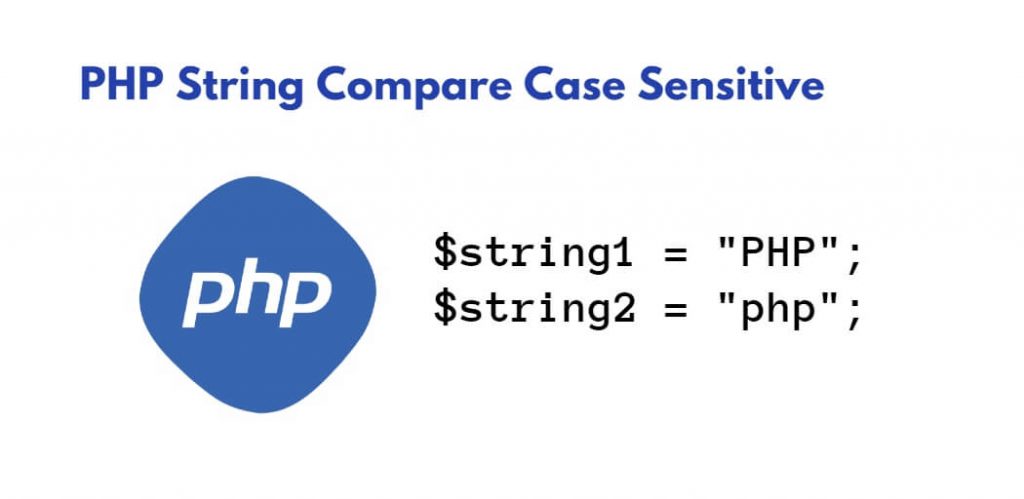Compare case sensitive string in PHP; In this tutorial, you will learn how to compare case-sensitive string in php and how it works.
String comparison is the process of checking whether two strings are equal or not. In PHP, there are two types of string comparisons: case-sensitive and case-insensitive.
Case-sensitive string comparison means that the comparison is done with respect to the case of the characters. For example, the strings “PHP” and “php” are not equal in case-sensitive comparison. On the other hand, in case-insensitive comparison, the strings “PHP” and “php” are considered equal.
How to Compare Case Sensitive in PHP
PHP provides several built-in functions for string comparison, such as strcmp(), strcasecmp(), and strnatcmp(). In this article, we will focus on strcmp() and strcasecmp().
strcmp() function:
The strcmp() function compares two strings and returns a value based on the result of the comparison. If the two strings are equal, the function returns 0. If the first string is greater than the second string, the function returns a value greater than 0. If the second string is greater than the first string, the function returns a value less than 0.
Here is an example of using strcmp() function for case-sensitive string comparison:
$string1 = "PHP";
$string2 = "php";
$result = strcmp($string1, $string2);
if($result == 0){
echo "The strings are equal";
}else{
echo "The strings are not equal";
}
The code snippet above demonstrates how to use the PHP strcmp() function to compare two strings in a case-sensitive manner. Here’s a breakdown of how it works:
- Two string variables,
$string1and$string2, are initialized with the values “PHP” and “php”, respectively. - The
strcmp()function is called with the two string variables as arguments. This function returns an integer value, which represents the difference between the two strings. If the two strings are equal,strcmp()returns 0. - The integer value returned by
strcmp()is stored in a new variable,$result. - An
ifstatement is used to check whether$resultis equal to 0. If it is, the message “The strings are equal” is printed to the screen. Otherwise, the message “The strings are not equal” is printed.
In this case, since $string1 and $string2 are different in terms of their case (one is “PHP” and the other is “php”), the strcmp() function will return a value that is not equal to 0. Therefore, the message “The strings are not equal” will be printed to the screen.
strcasecmp() function:
The strcasecmp() function is similar to strcmp() function, but it performs a case-insensitive comparison. If the two strings are equal, the function returns 0. If the first string is greater than the second string, the function returns a value greater than 0. If the second string is greater than the first string, the function returns a value less than 0.
Here is an example of using strcasecmp() function for case-insensitive string comparison:
$string1 = "PHP";
$string2 = "php";
$result = strcasecmp($string1, $string2);
if($result == 0){
echo "The strings are equal";
}else{
echo "The strings are not equal";
}
The above code snippet demonstrates how to compare two strings in PHP using the strcasecmp() function, which performs a case-insensitive comparison of two strings.
The first two lines declare two string variables, $string1 and $string2, and initialize them with the values “PHP” and “php”, respectively.
The next line calls the strcasecmp() function and passes the two string variables as its arguments. The function compares the strings case-insensitively and returns an integer value indicating the result of the comparison. If both strings are equal, the function returns 0. If the first string is greater than the second string, it returns a positive integer. If the second string is greater than the first string, it returns a negative integer.
The returned integer value is stored in the $result variable.
The next block of code uses an if-else statement to check whether the two strings are equal or not. If the value of $result is 0, it means that the strings are equal, so the code block inside the if statement is executed, which simply prints the message “The strings are equal” using the echo statement. If the value of $result is not 0, it means that the strings are not equal, so the code block inside the else statement is executed, which prints the message “The strings are not equal” using the echo statement.
Conclusion
In conclusion, PHP string compare case-sensitive is an essential operation for developers. It is used to check whether two strings are equal or not with respect to the case of the characters. PHP provides built-in functions such as strcmp() and strcasecmp() for string comparison. Developers must choose the appropriate function based on their needs.
